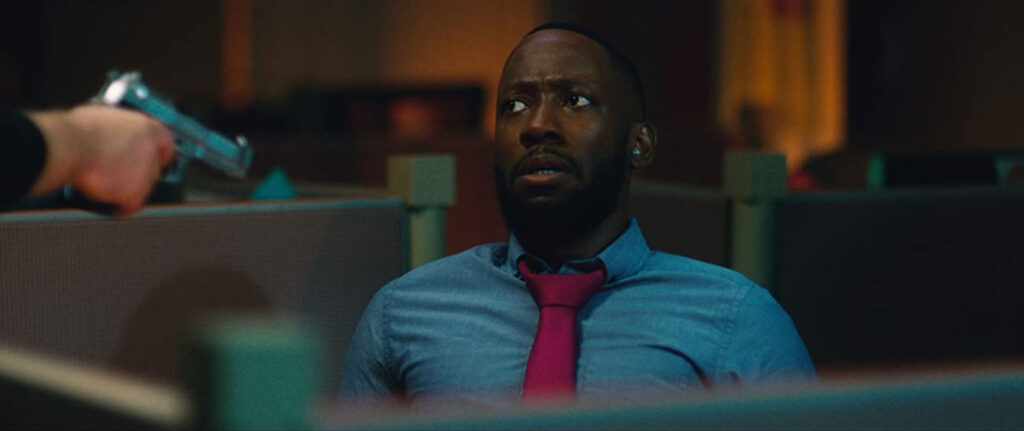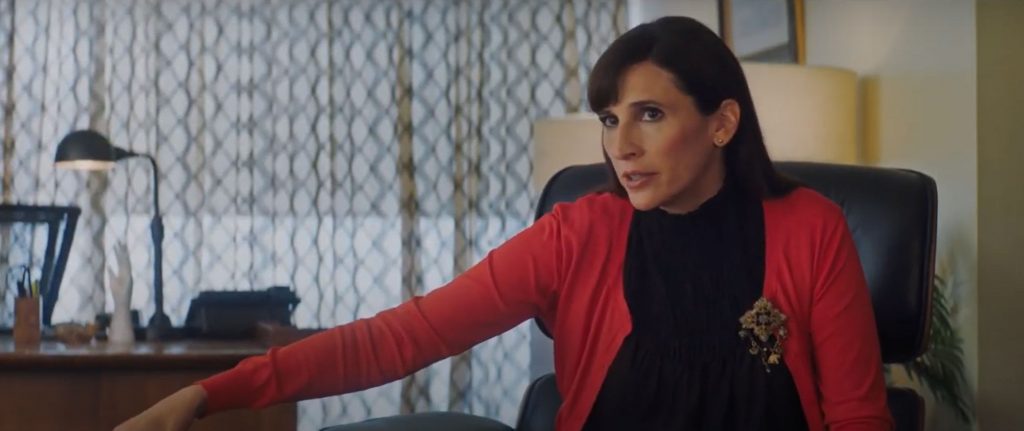March 3, 2022
by Carla Hay

Directed by Khaled Ridgeway
Culture Representation: Taking place in California’s San Fernando Valley, the comedic film “Death of a Telemarketer” features a cast of African American and white characters (with a few Latinos and Asians) representing the working-class and middle-class.
Culture Clash: An overly ambitious telemarketer is held hostage by a man who’s angry about the lies the telemarketer told to try and get a sale.
Culture Audience: “Death of a Telemarketer” will appeal primarily to people who don’t mind watching idiotic and boring comedies.

How bad is “Death of a Telemarketer,” a movie that’s trying to pass itself off as an edgy comedy? The only real “death” in this garbage movie is any hope that watching this film will be an enjoyable experience. It’s excruciatingly horrible, with comedy that’s not funny and filled with extremely annoying characters.
Written and directed by Khaled Ridgeway, “Death of a Telemarketer” does everything wrong in a movie that’s supposed to be a comedy. The jokes are terrible. The pacing is dull. The scenarios are mind-numbingly stupid. The acting is substandard. And there’s barely anyone to root for in this moronic film.
The movie’s central character is Kasey Miller (played by Lamorne Morris), a cocky and unscrupulous telemarketer who has ambitions to be the top sales employee at Telewin!, the company where he works in California’s San Fernando Valley. He works in a call center, and his job is selling phone/cable TV/Internet packages to people, even if they don’t really want or need them. Like a lot of shady telemarketers, Kasey will do whatever it takes, including lie to people, in order to get the sale.
One day, a Telewin! supervisor named Liz Carson (played by Gwen Gottlieb) announces to the call center’s telemarketers that there will be a contest where the top-selling telemarketer will get $3,000 as a prize bonus. There will be a penalty for any telemarketer who gets a caller asking to be put on the Do Not Call list. Predictably, Kasey thinks he can easily win this contest.
Kasey has some competition from a religious co-worker named Barry (played by Woody McClain), who thinks he can get sales through more ethical means than the tactics that Kasey uses. There’s a considerable amount of time wasted on the rivalry between Kasey and Barry, which leads to a lot of painfully unfunny jokes. Kasey uses some bizarre tactics for closing a sale, including promising free Rick James wigs (styled to look like the cornrows that the singer wore in the 1980s) to customers who agree to buy what Kasey is selling. The promise of free Rick James wigs is used as a stupid gag later in the movie.
Kasey can get so outlandish in his sales calls that one of his calls is recorded and put on YouTube as an example of how telemarketers can be scammers. The video goes viral. And when supervisor Liz finds out and calls Kasey into her office, Kasey thinks he might get reprimanded or worse. Instead, Liz praises him because this viral video showed how Kasey made a sale by being relentless. She’s so impressed with Kasey that she tells everyone that they should emulate his unethical way of selling, which she calls the Kasey Method.
In a movie that’s polluted with unimaginative clichés, the protagonist is successful at his job but unsuccessful in love. Kasey is trying to win back his ex-girlfriend Christine (played by Alisha Wainwright), who works at a hair salon and is studying to get her master’s degree in psychology. One day, Kasey shows up at the hair salon with a bunch of roses, which he hands out to the customers to try to impress Christine. She reluctantly agrees to go to dinner with him.
During conversations between Kasey and Christine, it’s eventually revealed that Kasey dropped out of law school and is drifting, when it comes to his career. Because of Kasey’s aimless direction in life, he’s become estranged from his father. Christine is paying her own tuition for grad school, and reveals that Kasey has a privileged background when she says about her tuition, “Unlike you, I don’t have a father footing the bill.”
Christine isn’t too happy about the fact that she hasn’t met all of Kasey’s family. He doesn’t want her to meet his father. She also doesn’t like it when he treats her like a sales customer. Those are some of the hints that the movie drops to show why Christine broke up with Kasey. But even without those hints, it’s easy to see why the relationship didn’t work: Kasey is a selfish twit.
Something happens during the contest at work that propels Kasey to want to go to extremes to be considered the company’s top salesperson. One evening, when he’s supposed to meet Christine for dinner, he postpones the date so that he can stop by the office while everyone has left. Kasey has decided to call people who are on the Do Not Call list to try to sell them what they refused before.
One of the people he calls is Asa Ellenbogen (played by Jackie Earle Haley), an elderly man whom Kasey has targeted because he thinks old people are especially gullible to telemarketers. Before he made the call, Kasey looked up Asa on Facebook and pretends to be a friend of Asa’s named Phil French. Asa and Phil used to be in the same marching band when they were in high school.
Kasey impersonates Phil on the phone and asks Asa to buy this Telewin! phone/cable TV/Internet package as a favor. Asa mentions that his son Dean (played by Haley Joel Osment) needs a job, so Asa asks “Phil” if he can get Dean a job at the company. Of course, “Phil” lies and says yes. Kasey thinks the scam call is going well until Asa angrily announces that the real Phil French is dead. And through a series of circumstances, Asa shows up at the office and takes Kasey hostage as revenge.
This hostage storyline of “Death of a Telemarketer” doesn’t happen until the last third of the movie. What should have been the funniest part of the film is a tedious slog that just has a lot of yelling. It just makes all the characters more irritating.
The acting in the movie ranges from over-the-top silly to dreadfully boring. All of the dialogue is simply horrendous. “Death of a Telemarketer” is so ill-conceived, it’s mind-boggling that this time-wasting junk got financing. There might or might not be any death in this movie, but watching it feels like an assault on viewers’ time and intelligence.
Vertical Entertainment and Sony Pictures Entertainment released “Death of a Telemarketer” in select U.S. cinemas, on digital and VOD on December 3, 2021.


